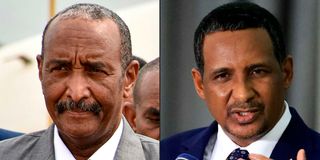
This combination of pictures created on April 18, 2023 shows Sudan's army chief, Lieutenant-General Abdel Fattah al-Burhan (left) and Mohamed Hamdan Daglo who commands the paramilitary Rapid Support Forces.
Sudan’s war is turning into economic sabotage as rival factions seek to undercut one another, leading to the clearest sign that a winner from this conflict will still bear the loss.
And ten months since the Rapid Support Forces (RSF) launched a war on the Sudan Armed Forces (SAF), the character of this war has morphed in such a way that original factions have also amassed support from fringe militia groups, expanding the scale of interests.
Yet the biggest problem for Sudan now is destruction of crucial economic infrastructure such as telecom masts and transportation routes, keeping some of the regions cut off from the outside world.
The services of the three telecommunications companies Sudani, MTN and Zain “have stopped in most regions of Sudan, causing an almost complete paralysis of the activities of banks and some tax and customs collection services in the country's ports,” said a statement on Monday by the Telecommunications Regulatory Authority under the junta of Abdel Fattah al-Burhan, the leader of SAF.
It accused the Rapid Support Forces of stopping work in the data centers of Sudani and MTN, demanding the restoration of communications to some cities they controlled in the western Darfur region, where service was suspended as a result of the burning of several towers, fibre vandalism, power outages and lack of fuel.
Sudanese embassies abroad announced the suspension of parts of their consular services, amid mutual accusations from both fighting sides about who bears the responsibility for cutting off the network.
Economic sabotage, the act of destroying or preventing certain critical services from reaching communities, is not a new weapon in wars, but has been mostly used by insurgent groups fighting for separation or certain ideological acceptance.
In Somalia and Kenya, al-Shabaab militants have often destroyed communication masts.
In Sudan, this seems more focused on punishing communities than to endear ideology. All the three firms reported disruption of communication and internet networks in Sudan, especially in the city of Port Sudan in Red Sea State, which the military has adopted as an alternative capital following the outbreak of conflict with the RSF on April 15 which destroyed the main airport in Khartoum.
Most banks have also gone out of service and digital banking applications have been disrupted that many rely on for money transfers, especially in the capital Khartoum and other conflict-prone cities, where families rely on their relatives helping from outside the country and safe states through bank transfers.
The conflict parties in Sudan accuse each other of cutting off communications in several areas of the country, which has imposed a blackout on events there, especially in the conflict areas in the capital Khartoum and the regions of Kordofan and Darfur.
The Rapid Support Forces denied having a role in the interruption of the communications network, and argued that the army had previously cut off communications in a number of places controlled by the RSF.
Both the RSF and the SAF senior lieutenants have been sanctioned by the US and UK targeting to prevent them from accessing the financial system to feed the war. But it hasn’t stopped the fighting nor discouraged arms supply.
Fears are growing about the serious humanitarian, health and economic repercussions that could result from about 95 percent of Sudan's regions being out of the coverage of telecommunications networks and the Internet for more than a week.
Humanitarian agencies say the war had already led to some 18 million people facing hunger in Sudan with some 700,000 children malnourished, according to CARE, one of the charity organisations providing relief, including a children’s stabilisation centre.
“The conflict in Sudan has displaced over 6 million individuals within the country, half of whom are children, making it the largest displacement of children globally,” said Marie David, CARE International in Sudan Country Director on Tuesday.
“Children, already vulnerable, face worsened conditions due to the fighting. They are missing meals, suffering stunted growth, and facing increased risks of deadly diseases. Children under five endure acute malnutrition at incredibly high levels, with hundreds of thousands fighting life-threatening malnutrition. Without quick intervention, millions face hunger as famine is looming.”
Sudan’s war has displaced more than 2 million people into neighbouring countries. But even there, they are too crowded to get any good service. Jan Egeland, the Secretary General of the Norwegian Refugee Council said the situation in Chad echoes past conflict spillovers from Darfur. But he argued no one is making noise about it this time.
“Today we have three times the number of refugees who fled to Chad in 2003 and 2004. But this time international outrage and solidarity is missing. None of the peace initiatives or relief plans have had any real impact on the suffering inside Sudan or in neighbouring refugee camps,” he said.

Heba checks her phone for news of her relatives as she sits on the rooftop of her house during the conflict in Khartoum, Sudan, April 30, 2023.
“The sheer number of refugees here in Chad, and their harrowing testimonies, tell a story of almost unimaginable human suffering and violence. And yet those we listen to and support in Chad represent the mere tip of the iceberg. The war is shattering an entire region in the heart of Africa,” he said.
The United Nations has launched an appeal for $4.1 billion to meet their humanitarian needs, as well as provide support to those who have fled to neighbouring countries.
The decade-long war between the armed forces and the RSF has devastated the country's infrastructure, triggering warnings of famine and millions of people inside and outside the country.
In a joint appeal with the United Nations High Commissioner for Refugees (UNHCR), the UN Office for the Coordination of Humanitarian Affairs called for $2.7 billion in funding to provide humanitarian aid to 14.7 million people.
UN Under-Secretary-General for Humanitarian Affairs and Emergency Relief Coordinator Martin Griffiths told diplomats at UN headquarters in Geneva: “The international community is still forgetting Sudan.”
Meanwhile, a group of Democratic and Republican senators has introduced a bill that would classify “the actions of the Rapid Support Forces and allied militias in Darfur against non-Arab ethnic communities as genocide.”
The draft was presented by Foreign Relations Committee Chairman Benjamin Cardin and a group of legislators from both parties.
The draft text calls for an immediate halt to the war, violence, and atrocities in Sudan, and urges the United States to take urgent steps to work with the international community “to establish mechanisms to protect civilians, including establishing safe zones and humanitarian corridors, implement the Security Council arms embargo in Darfur, and meditate to reach a comprehensive ceasefire and disarm the warring parties in Sudan.
It also calls on the White House to support the documentation of atrocities and acts of genocide in Sudan “on a continuous and transparent basis through a mechanism that works to publish these documents publicly and periodically.”
Genocide is punishable under the UN Convention on the Prevention and Punishment of the Crime of Genocide of 1948 to which Sudan entered in 2003 but never ratified.





